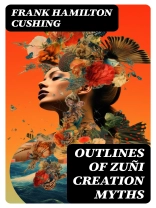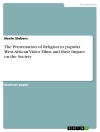In ‘Outlines of Zuñi Creation Myths, ‘ Frank Hamilton Cushing presents a captivating exploration of the rich tapestry of Zuñi cosmology. Through a meticulous collection of oral traditions and narratives, the book employs a narrative style that blends ethnographic observation with poetic lyricism, offering readers not only a glimpse into the Zuñi world but also a profound appreciation for the community’s cultural heritage. The text serves as a crucial document reflecting the late 19th-century anthropological discourse as Cushing seeks to preserve these vital narratives at a time when Indigenous cultures were at risk of erasure. Frank Hamilton Cushing, an early American anthropologist, was profoundly influenced by his experiences living among the Zuñi people of New Mexico. His commitment to understanding and accurately depicting Indigenous cultures fueled his interdisciplinary approach, which intertwined anthropology, linguistics, and art. Cushing’s work was pioneering for its time, as he advocated for the importance of Indigenous voices and the preservation of their stories. ‘Outlines of Zuñi Creation Myths’ is an essential read for anyone interested in anthropology, Indigenous studies, or the power of storytelling. Cushing’s work invites readers to reflect on the profound connections between myths and cultural identity, making it a vital addition to the scholarly discourse surrounding Native American literature.
Despre autor
Frank Hamilton Cushing (1857–1900) was an American anthropologist and ethnologist, renowned for his significant contributions to the study of Indigenous cultures of the Southwestern United States, particularly the Zuñi people. Born on July 22, 1857, in Northeastern Pennsylvania, Cushing showed an early talent for the study of artifacts and natural history. His devotion to fieldwork led him to become one of the pioneer participant-observers in anthropology, when, at the tender age of 22, he commenced living with the Zuñi people. During his five-year stay commencing in 1879, he was initiated into the tribe, a testament to the deep relationships he fostered and the cultural insights he gained (Lange, 1993). His intricate understanding of Zuñi culture and languages enabled him to write numerous influential works, but perhaps none is more significant than ‘Outlines of Zuñi Creation Myths’ (Cushing, 1896), which provided a comprehensive glimpse into the complex cosmogony and spiritual life of the Zuñi. Cushing’s approach was characterized by empathetic immersion, detailed observation, and a literary style that sought not just to describe, but to evoke the lived reality of the Zuñi world (Hinsley, 1981). Alongside his fieldwork, Cushing contributed to the establishment of the discipline of American anthropology and the study of Southwest Indigenous cultures. Tragically, his life and work were cut short when he died on April 10, 1900, but his pioneering methods and literary depictions of Indigenous life have left an indelible mark on both anthropology and ethnography.












